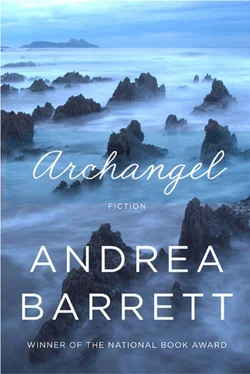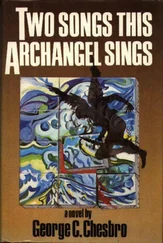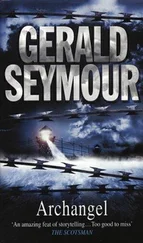for Cecile Pickart and William Bernhard
We cannot part with our friends. We cannot let our angels go.
We do not see that they only go out that archangels may come in. We are idolators of the old.
— RALPH WALDO EMERSON, “Compensation” (Essays: First Series, 1841)
Early that June, Constantine Boyd left Detroit with his usual trunk but got on a train headed east instead of west. For the past three summers he’d worked at his uncle’s farm in western Michigan, but now, just as he was becoming truly useful, his family had made other plans. Because a different uncle had requested the loan of him, he was being shipped elsewhere: like a harrow, or a horse.
He was twelve that summer of 1908, and he sulked all the way to Toledo, napped between Toledo and Cleveland, woke angry with his absent mother but then forgave her in Erie, when he found the cookies she’d slipped in beside the sandwiches. In Buffalo he passed a bank that looked like a castle, horses plodding along the canal, and a gigantic electric hoist moving grain from a ship into an empty boxcar. At the station where he switched for the train to Bath, he saw a motorized bicycle, one of the very sights his mother had promised, being chased by a terrier, and with that his bad mood slipped away. He was going someplace near water, he remembered. With new people, new things to see and do, away from the steaming city and his father.
In Bath, one of those new people carried Constantine’s trunk to a dusty automobile. “It was made up the road in Syracuse,” his mother’s younger brother said, running his knobby hand over the hood. “I know the engine’s inventor.”
“My mother says you’re an inventor too, sort of.”
“More of an … investigator,” his uncle said modestly. His hair was springy, almost wiry, brown strands mingled with surprising gray. “But I’ve made a few small things. Have you ridden in an automobile before?”
“Twice,” Constantine said, doubling his one ride in Detroit.
“You’re an old hand, then. Now”—the engine started with a clatter—“what shall we call each other? I’m not old enough for the whole uncle business. Why don’t you just call me Taggart?”
In profile, and despite his hair and his bony forehead, he did resemble Constantine’s mother. The two of them had grown up here, along with the older brother who owned the dairy farm where Constantine usually went. First Harry had headed west, wanting a bigger spread and land more suited to grain than vineyards. Then — this was almost all Constantine knew about this side of his family — his mother had gone to Detroit with his father. Taggart had stayed behind with their parents; later the parents had died.
His new uncle raced through the valley, showing off the engine’s power as they passed potato fields, vineyards, farmhouses, a cemetery. Long low hills, like rows of dogs with their rounded backs touching, lined the flats on either side and seemed to breathe with the shadows sliding down their flanks. His uncle, following the shadow of another cloud, said, “What do you like to be called?”
“Stan,” he said firmly. Why not try it out here? Stan was mature and experienced, not easily surprised.
“Stan,” his uncle repeated. And then they turned left up one of the hills and followed the curving road along a ridge before stopping at a white house surrounded by fields. His uncle carried the trunk inside. From the porch, which wrapped around most of the house, Constantine could see the tip of Keuka Lake below, a few boats still moving about and the moon, already visible, sharing the sky with the setting sun. The little cluster of buildings and streets between the lake and the base of their hill was, said Taggart, the village of Hammondsport.

CONSTANTINE SLEPT THROUGH that evening’s milking, through dinner, and all through the night, missing the morning milking as well. When he woke, he followed the smell of cooking sausage to the kitchen but stopped in the door when he found, instead of his uncle, a girl standing over the stove and a large man fiddling with some papers at the table.
“Come in!” the man said. “You must be the nephew.”
“Stan,” he said faintly.
“Mr. Wyman,” the man replied. “Or maybe”—he looked up at the actual uncle, who had just come in—“Uncle Ed?”
“I told him just to call me Taggart.”
“Very modern,” the stranger said. “Ed, then.”
A blocky person, in all dimensions: square shoulders, solid square trunk, broad palms, forehead like a playing card. Twenty-seven, twenty-eight? The same age, Constantine calculated, as his uncle.
“You — live here?” he ventured.
The men turned to watch a cardinal flash across the window. “Ed’s my lodger,” Taggart said, turning back. “We went to Cornell together. And this”—he gestured toward the girl at the stove, who looked to be about eighteen—“this is Beryl.”
She nodded, stacking sausage on a plate. Her hair was the same oaky brown as Ed’s, although she was much slighter — his sister, perhaps? In this wandering house, where each room was two steps up or one down from the next and where doors opened unpredictably into bedrooms or a hall or a porch, there might be a whole separate wing where lodgers lived.
“Beryl comes in daily,” Taggart said, moving behind Ed’s chair and next to her. “To cook for us, and clean.”
Beryl smiled and handed Taggart the plate. Three cheerful faces, perfectly unreadable behind their adult masks, smiling blandly at him. How were they all related? He had no idea what they were to each other, or how he was meant to fit in. Nor was the farmstead itself any more understandable at first.
Some things he recognized: vegetable garden, berry patch, fields of oats and timothy, horses and barns. An orchard, oddly arranged with many different types of trees. Corn, but instead of a big field with the stalks all similar, short rows interrupted by stakes and colored tags. The vegetable garden was dotted with labels, measuring tapes, and scales. A pond, fed by a little stream, was marked by colored glass floats, gates at either end, nets on the grass at the edge; a long bed of scraggly stems turned out not to be a vegetable but evening primroses from which the flowers had been snipped. Even the animals were unexpected, no flock or herd of any one thing. Three odd-looking red chickens mingled with half a dozen frizzled cochins and a dozen bearded, cream- and coffee-colored birds. There were big ducks and small, grey geese and white, some small fowl he didn’t recognize; a pair of Berkshire pigs but also Chester Whites and two breeds he’d never seen before. Goats, ewes, and — at last! — eleven milking cows, each golden brown and small but different in other ways. Where the Holsteins on his other uncle’s farm had been similar in size and color and temperament, here — were these Jerseys, mixed-breed, what?
Taggart and Ed had bred them, Constantine learned, as part of a project to develop a more compact cow with a modest yield of high-butterfat milk. A spring balance hung on the wall, next to a chart with a column for each cow and rows for each morning’s and evening’s milking; Constantine was to weigh each pail of milk and note the result. Also to weigh the amount fed to each calf, and to measure the calves themselves daily. The pigs and goats and lambs and fowl all had their own measurements, charts, and scales. And then the plants had to be measured and inspected, some had to be hand-pollinated, fruit trees wanted grafting, seedlings in cold frames needed transplanting — too much work, Taggart said, for just the two of them. Especially this summer, when they were also involved with other projects.
Читать дальше













